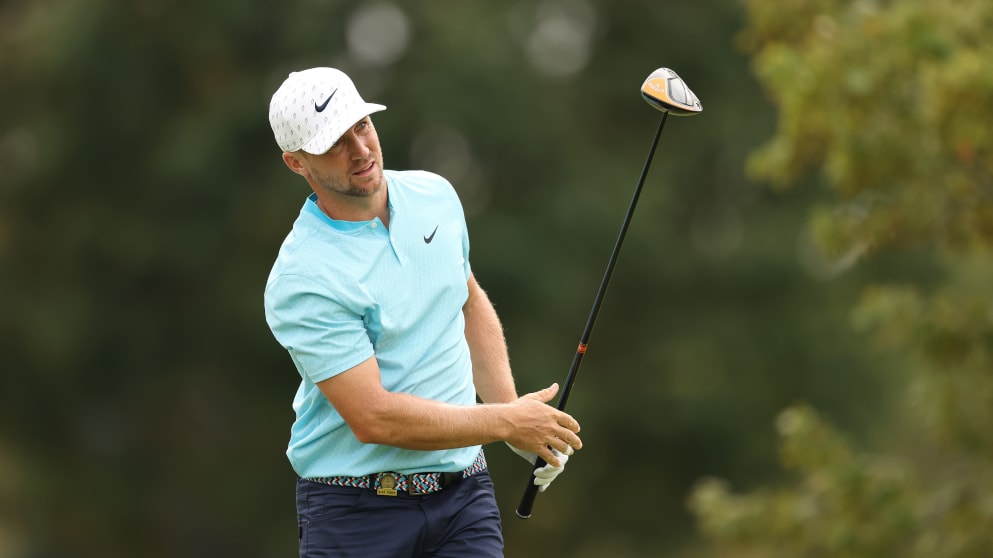Alex Noren produced one of the best rounds of his stellar career on the "hardest course I've ever played" with a breathtaking 67 at Winged Foot Golf Club on day three of the 2020 U.S. Open Championship.

The West Course at Winged Foot has long been regarded as one of the very toughest tests in golf, and when you combine that with a U.S. Open set-up, anything under par is a feather in the cap of even the very best golfer.
Hale Irwin won this title at seven over in 1974 in what became known as the "Massacre at Winged Foot", and the last time the U.S. Open was held here in 2006, Geoff Ogilvy won at five over.
Round one of the 2020 edition produced a five under par 65 from Justin Thomas and the response from the organisers, plus an increased wind, meant that only three players broke 70 on Friday, with Bryson DeChambeau eagling his last hole to record a 68.
Noren started the weekend right on the cut line ten shots off the lead but he is a man who can handle pressure on a tough track, a skill proven by his remarkable closing 62 at Wentworth Golf Club that made him the first ever Rolex Series champion in 2017.
With the wind blowing again, the Swede defied the odds to make four birdies and just a single bogey on day three in New York to get to a three over total.
"Starting out, it felt like it was going to be the toughest day ever on a golf course, with pretty strong winds on the first six, seven holes," he said. "Then it got a little bit easier, but the pins are still tricked up. I putted my life out.
How do you shoot 67 on Saturday of the #USOpen, at Winged Foot?
— The European Tour (@EuropeanTour) September 19, 2020
Answer: pic.twitter.com/O9mLM4fPLm
"You hit some shots out here, you think it's a decent shot, and then you just make it into the rough and all of a sudden, the hole feels impossible. Normally, you hit decent drives or decent shots off the tee or into the greens and you get away with them. Here, you don't get away with anything.
"Yesterday I was a very angry man on the golf course and my goal today was to putt better and be in a little happier place. I just tried to be that way.
"Just view it as a normal tournament because, when you look at the putts, you look at the shots and you stand on the tee boxes, there's a lot more pressure on yourself. If you don't hit the fairway, you're going to struggle, and if you don't hit the greens, you're going to struggle.
"Normally, there is still opportunities to do well even from the rough or from a bunker, but here it's just try to just do your routine and hit the shot and, whatever happens, you've got to keep the energy because you'll need it down the round.
"Yesterday I was furious that I didn't hit the shots that I wanted, and then it kind of affects your game.
"The older I get... you don't really think about winning until you have the chance to win. I'm just trying to hit good shots and trying to warm up and do everything I can to just be in the best possible shape I can be golf-wise."
The 38-year-old won four times on the European Tour in 2016 and then claimed Rolex Series victories in 2017 and 2018 before famously holing a monster on the last at Le Golf National to put the cherry on the cake of Europe's 2018 Ryder Cup win.
You don't really think about winning until you have the chance to win. I'm just trying to hit good shots and trying to warm up and do everything I can to just be in the best possible shape I can be golf-wise
He has just one top ten since that famous autumn afternoon in Paris but he feels he has now stopped putting so much pressure on himself and that is bringing positive results.
"You accept the bad rounds easier because you've got the confidence, you have the results in the back, and when you don't get in for a while, you start pressing," he said.
"All of a sudden, you start focusing on 'is my technique wrong, is this wrong, is that wrong?'. If that would have happened, that bad play, for a couple of weeks when you're having those good weeks, you don't think about them.
"I think maybe it's a mix of not playing and technique is not up to point, but mostly kind of the pressure and stress you put on yourself.
"I changed kind of the last two, three months, I changed how I practise. I practised on the golf course a little bit at home, trying to not be on the driving range, trying to work on maybe situations more than a specific look of the swing. So a lot more on the course.
"Then it kind of frees up my game. I don't look at my swing on a video camera, don't analyse. Just if the shots are good enough, I'm happy. If they're not, I go out and work on them."







